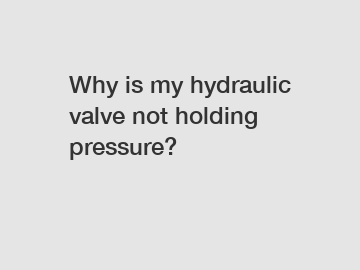Why is my hydraulic valve not holding pressure?
Hydraulic valves play a crucial role in ensuring the smooth functioning of hydraulic systems. However, encountering issues with these valves, such as not holding pressure as intended, can be frustrating and cause disruptions to your operations. In this blog post, we will explore common reasons behind hydraulic valves failing to hold pressure, providing you with valuable insights to diagnose and address the issue effectively.
1. Insufficient Oil Supply:
One of the primary reasons for hydraulic valves not holding pressure could be related to the oil supply. A lack of sufficient oil in the system can lead to inadequate pressure. Ensure that the hydraulic reservoir is properly filled with clean and compatible hydraulic fluid as recommended by the manufacturer. Additionally, check for any blocked or clogged filters that might be hindering the oil flow.

2. Malfunctioning Seals:
Faulty seals within the hydraulic valve can result in pressure loss. Over time, seals can wear out or become damaged due to factors like excessive heat, high operating pressure, or contamination. Inspecting seals for signs of wear, leaks, or deformations is crucial. Replace any worn-out or damaged seals promptly to restore proper pressure holding ability.
3. Internal Leakage:
Internal leakage occurs when fluid passes through pathways other than intended within the hydraulic valve. This can be caused by worn-out valve components, such as spools, seats, or seals. Pressure drops can result from incorrect clearances or misalignment of these components. Inspecting and servicing the valve internals or replacing defective parts can often resolve these issues.
4. Contamination and Particulate Matter:
Contamination is a common enemy of hydraulic systems. Particle buildup within the hydraulic fluid can affect the performance of the valve, resulting in decreased pressure-holding capabilities. It is essential to regularly monitor and maintain cleanliness in the hydraulic system by employing efficient filtration systems and adhering to proper fluid handling practices.
5. Valve Actuator Problems:
The actuator, responsible for initiating valve movements, can contribute to pressure loss if not functioning correctly. Low-quality or worn-out actuators may struggle to provide the necessary force to hold pressure effectively. Check for any mechanical issues, such as worn pivot points, damaged springs, or insufficient lubrication, within the actuator system. Rectifying these issues can significantly enhance pressure holding capacity.
6. External Leaks:
While it may seem obvious, external leaks in the hydraulic system can often go unnoticed. Even small leaks can lead to significant pressure loss over time. Regularly inspect the entire system, including connections, hoses, and fittings, for any signs of leakage. Replace or repair any damaged components promptly to prevent pressure loss.
Conclusion:
When a hydraulic valve fails to hold pressure, it can be attributed to various factors, from inadequate oil supply and malfunctioning seals to internal leakage and contamination. Understanding these potential causes allows you to troubleshoot and address the issue promptly, ensuring optimal performance of your hydraulic system.
Regular maintenance, adherence to recommended practices, and maintaining a clean and well-lubricated system are necessary for preventing pressure loss in hydraulic valves. Remember, it is always advisable to consult with hydraulic experts or reputable service providers for more complex issues or if you lack the necessary expertise.
By tackling pressure holding problems with a proactive approach, you can minimize downtime, increase operational efficiency, and extend the lifespan of your hydraulic valves.
Contact us to discuss your requirements of tubular check valve Price, Electromagnetic Relief Valve, Applications of hydraulic proportional valves. Our experienced sales team can help you identify the options that best suit your needs.
127
0
0


Comments
All Comments (0)